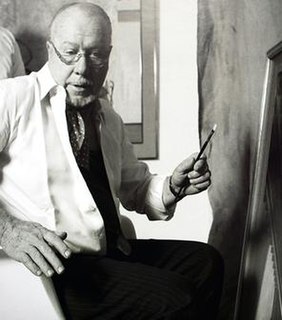A Quote by Hyon Gyon
The subjects in my work appear as unidentified ghosts that can't be said to be of this world. I've decided to call them incarnations. In various religions, myths, and legends, the word "incarnation" refers to the birth or emergence of transcendent beings in the form of humans or other bodies. If "incarnation" denotes the appearance of an abstract being in some concrete form, in a gut ceremony, a shaman could be considered an incarnation of our desires, hopes, and sorrows. The incarnations that appear in my work are always new and I meet them for the first time by drawing them.
Quote Topics
Abstract
Always
Appear
Appearance
Being
Beings
Birth
Bodies
Call
Ceremony
Concrete
Considered
Could
Decided
Desires
Drawing
Emergence
First
First Time
Form
Ghosts
Gut
Hopes
Humans
Incarnation
Legends
Meet
Myths
New
Other
Our
Religions
Said
Some
Sorrows
Subjects
Them
This World
Time
Transcendent
Various
Word
Work
World
Related Quotes
One of the awful things about writing when you are a Christian is that for you the ultimate reality is the Incarnation, the present reality is the Incarnation, and nobody believes in the Incarnation; that is, nobody in your audience. My audience are the people who think God is dead. At least these are the people I am conscious of writing for.
The true makes of history are the spiritual men whom the world knew not, the unregarded agents of the creative action of the Spirit. The supreme instance of this-the key to the Christian understanding of history-is to be found in the Incarnation- the presence of the maker of the world in the world unknown to the world. ... The Incarnation is itself in a sense the divine fruit of history-of the fullness of time-and it finds its extension and completion in the historic life of the Church.
All men, in the abstract, are just and good; what hinders them, in the particular, is, the momentary predominance of the finite and individual over the general truth. The condition of our incarnation in a private self, seems to be, a perpetual tendency to prefer the private law, to obey the private impulse, to the exclusion of the law of the universal being.
Therefore it is unnecessary for a prince to have all the good qualities I have enumerated, but it is very necessary to appear to have them. And I shall dare to say this also, that to have them and always to observe them is injurious, and that to appear to have them is useful; to appear merciful, faithful, humane, religious, upright, and to be so, but with a mind so framed that should you require not to be so, you may be able and know how to change to the opposite.
We all return. It is this certainty that gives meaning to life and it does not make the slightest difference whether or not in a later incarnation we remember the former life. What counts is not the individual and his comfort, but the great aspiration to the perfect and the pure which goes on in each incarnation.



























